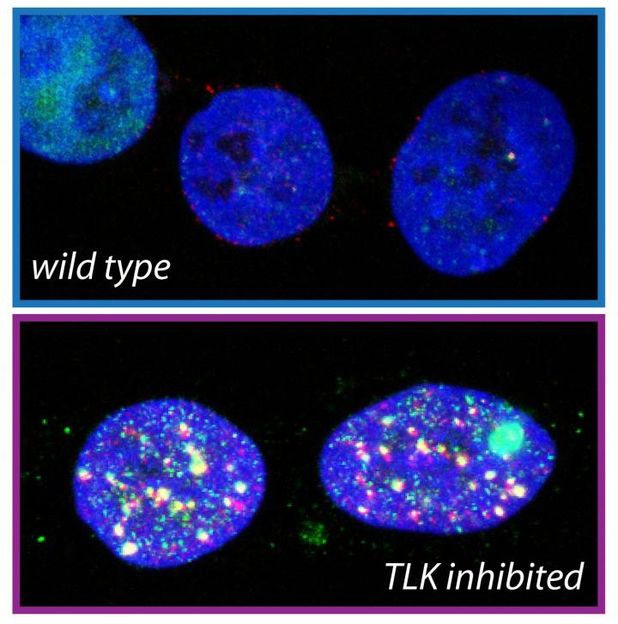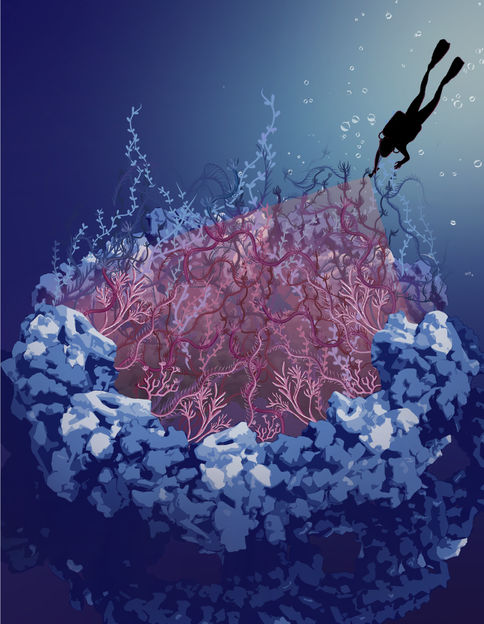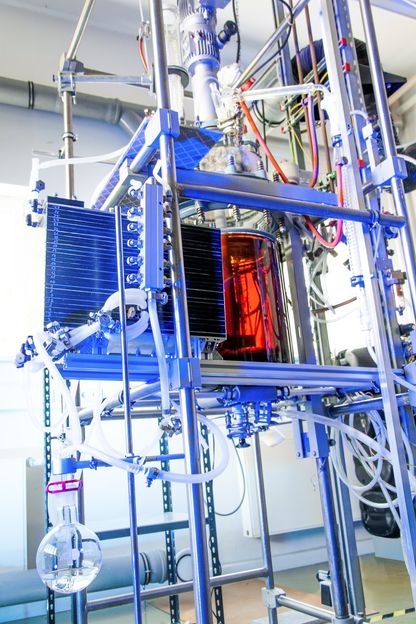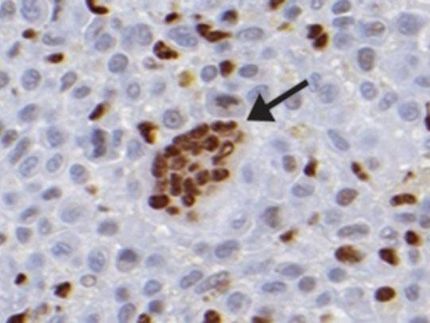Key role found for enzymes in DNA replication and sensitivity to chemotherapeutic drugs
During cell growth, cells copy their DNA through a process called DNA replication. For this process to be accurate, the genetic and epigenetic information must be copied flawlessly. In this regard, researchers led by Travis H. Stracker at the Institute for Research in Biomedicine (IRB Barcelona), in collaboration with Anja Groth's group at the Biotech Research & Innovation Centre (BRIC), have identified a key role for the TLK1 and TLK2 enzymes in DNA replication.

TLK inhibition leads to replication stress (green) and extensive DNA damage (red) in cultured cancer cells.
Sandra Segura-Bayona, IRB Barcelona.
"We demonstrated that TLK activity is critical to prevent extensive DNA damage and cell death during DNA replication. And in some human cancers, TLK1 and TLK2 correlate with clinical outcome, thus supporting the idea that they may be promising targets for inhibition," explains Travis H. Stracker, head of the Genomic Instability and Cancer Lab.
The study is based on previous studies that pointed to TLK1/2 as potential candidate targets in cancer therapy, and it provides new molecular details on their key functions in cancer cell proliferation.
This collaborative study has used state-of-the-art molecular approaches to analyze DNA replication and DNA damage, as well as the computational analysis of publicly available cancer data from the Cancer Genome Atlas (TCGA) project.
Fueling the faithful duplication of DNA
The scientists have demonstrated that TLK1 and TLK2 activity is crucial for regulating the availability of histones, abundant proteins that protect DNA, provide structure and carry epigenetic information. "When DNA is copied, cells need to provide twice as many histones and deposit them properly in order to maintain genetic and epigenetic information. If there are too few histones, crucial information is lost and DNA damage occurs," explains Sandra Segura-Bayona, PhD student in the Genomic Instability and Cancer Lab and one of the first authors of the study.
Potential targets for cancer therapy
The researchers examined the status of the TLK1 and TLK2 genes in over 7000 patient samples made publically available by the Cancer Genome Atlas project. They found that these genes are rarely mutated in cancers, thereby suggesting a potentially conserved role. In many cases, the TLK1 and TLK2 genes were duplicated or overexpressed and in several types of cancer, high expression correlated with poor patient outcome.
Although previous studies had proposed that TLK1/2 were potential targets for breast cancer therapy, this study demonstrates that their inhibition could be useful for the treatment of various kinds of cancer and may enhance the activity of several chemotherapeutic agents currently in clinical trials. These enzymes therefore emerge as potential targets for future drug development.
Original publication
Lee, Sung-Bau and Segura-Bayona, Sandra and Villamor-Pay{\`a}, Marina and Saredi, Giulia and Todd, Matthew A. M. and Attolini, Camille Stephan-Otto and Chang, Ting-Yu and Stracker, Travis H. and Groth, Anja; "Tousled-like kinases stabilize replication forks and show synthetic lethality with checkpoint and PARP inhibitors"; Science Advances; 2018
Most read news
Original publication
Lee, Sung-Bau and Segura-Bayona, Sandra and Villamor-Pay{\`a}, Marina and Saredi, Giulia and Todd, Matthew A. M. and Attolini, Camille Stephan-Otto and Chang, Ting-Yu and Stracker, Travis H. and Groth, Anja; "Tousled-like kinases stabilize replication forks and show synthetic lethality with checkpoint and PARP inhibitors"; Science Advances; 2018
Topics
Organizations
Other news from the department science

Get the life science industry in your inbox
By submitting this form you agree that LUMITOS AG will send you the newsletter(s) selected above by email. Your data will not be passed on to third parties. Your data will be stored and processed in accordance with our data protection regulations. LUMITOS may contact you by email for the purpose of advertising or market and opinion surveys. You can revoke your consent at any time without giving reasons to LUMITOS AG, Ernst-Augustin-Str. 2, 12489 Berlin, Germany or by e-mail at revoke@lumitos.com with effect for the future. In addition, each email contains a link to unsubscribe from the corresponding newsletter.
Most read news
More news from our other portals
Last viewed contents

8.5 million euros for innovative start-up teams to strengthen biotechnology in Bavaria - Bio M opens new start-up incubator
Evotec and Takeda enter into multi-year gene therapy research alliance
GxP Consulting Announces New Expansion Strategy into US and UK Markets

Fantastic muscle proteins and where to find them - “This is going to be unexpected even for myosin researchers”

Cancer Treatment with Built-in Light - Deep photodynamic therapy: photosensitizer irradiates itself
Silence Therapeutics Forms Scientific Advisory Board
InteRNA Technologies and Dana-Farber Cancer Institute to collaborate on the role of microRNAs in cancer pathways
Bayer Animal Health and Paraco agree on access to lead molecules

Wiggly proteins guard the genome - Dynamic network in the pores of the nuclear envelope blocks dangerous invaders

Defective immune cells in the brain cause Alzheimer’s disease - Scientists are studying the role of immune cell activation in Alzheimer's disease

Sepsis in Children: Improved Diagnosis Thanks to New Global Criteria - Researchers applied machine-learning methods to extrapolate from the data analysis evidence-based criteria for diagnosing






















































